Google has, time and time again avoided – or even flat out refused – to give any indication of when it rolled out an update. Their way of doing this has been always to assert that they make updates to their algorithms on a continuous basis, rather than having distinct launch dates for particular releases. It’s not difficult to see why that’s probably a good idea. It keeps everyone guessing and acting on a desire to actually improve their SEO techniques rather than a temptation to eschew the latest changes. It’s the equivalent of saying that Santa Claus exists and watches you all the time and any time you’re naughty you might get the stick instead of the high rating. Except you don’t know when Christmas is and it might happen every other day or so.
Assumptions on a fresh Google update were immediate. And, like it previously happened, the alleged new algorithm has already a name and a face. Google Fred seems to be the name and, preserving the tradition where cute animal figures represent Google’s updates, this time a fish seems to have won the mascot contest. Much uproar stirred up lately with lots of webmasters and SEO pros noticing massive ranking drops. And as “coincidence” doesn’t seem plausible at all when we are looking at Google algorithm changes, the Google Fred Update seems to be responsible for the dropped ranks and organic traffic.

Once Is Happenstance. Twice Is Coincidence. Three Times Is Google Fred Update?
Whenever someone thinks they’ve discovered a new algorithm update, it always feels a bit like you’re in an X-Files episode. You’ve stumbled upon something that really doesn’t seem right, but If you suggest it’s the hand of the “powers that be,” people might look at you funny. All the while Google slyly smiles and reaffirms its uneventful day-to-day existence. But as the saying goes, just because you’re paranoid doesn’t mean they aren’t after you. And so it turns out that there may (or may not) be a new update and if there is, it’s named Fred. In fact, all future updates might be called Fred from now on if we were to look after Gary Illlyes’ affirmation. So we might need to say goodbye to Google Penguin and Panda, for the moment, because algorithm updates have gotten even just a little bit less cute (no offense to the Freds of this world).
It’s a cat and mouse game where both Google and its paying customers are trying to get ahead of each other.
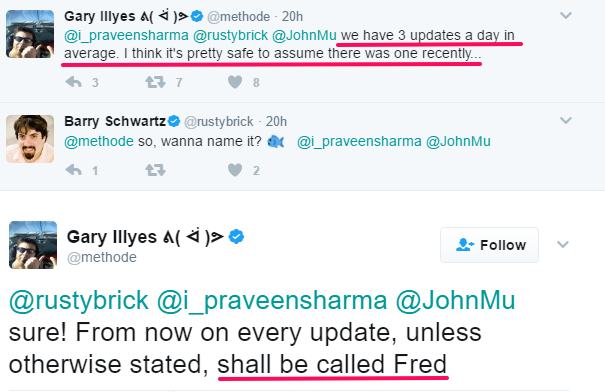
How do you identify a potentially significant algorithm update?
There’s no single metric that will tell you it happened, but if you gather enough significant indicators, you might just be onto something (if it looks like a duck and quacks like a duck… it might be a Fred).
Barry Schwartz, of Search Engine Roundtable, may have just stumbled on some quacks. While his interaction with Google’s Gary Illyes (and john Mueller) on social media has yielded business as usual in terms of confirming suspicions (with a traditional “Yes, we make changes almost every day”), his data analysis seems to suggest there could be something significant at work. The most significant signals come from different measurements of search engine ranking position (SERP) fluctuations.
As we took a look at some specialized tools, we can see some fluctuations in the last days, variations that can or not be correlated with a new Google quality update.
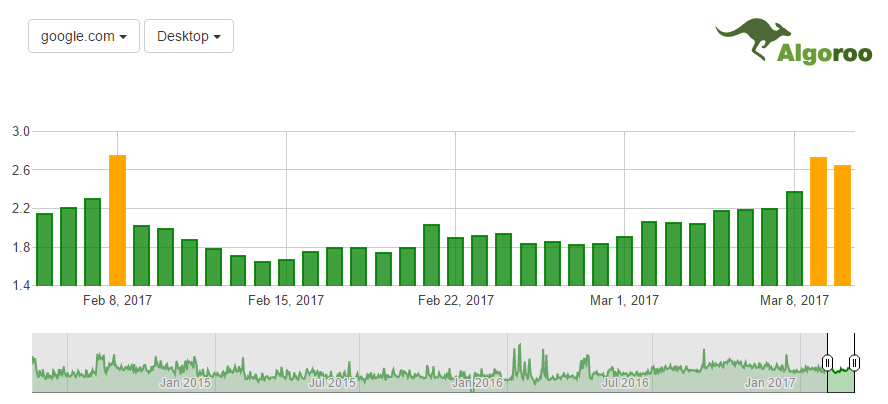
Screenshot taken from algoroo.com
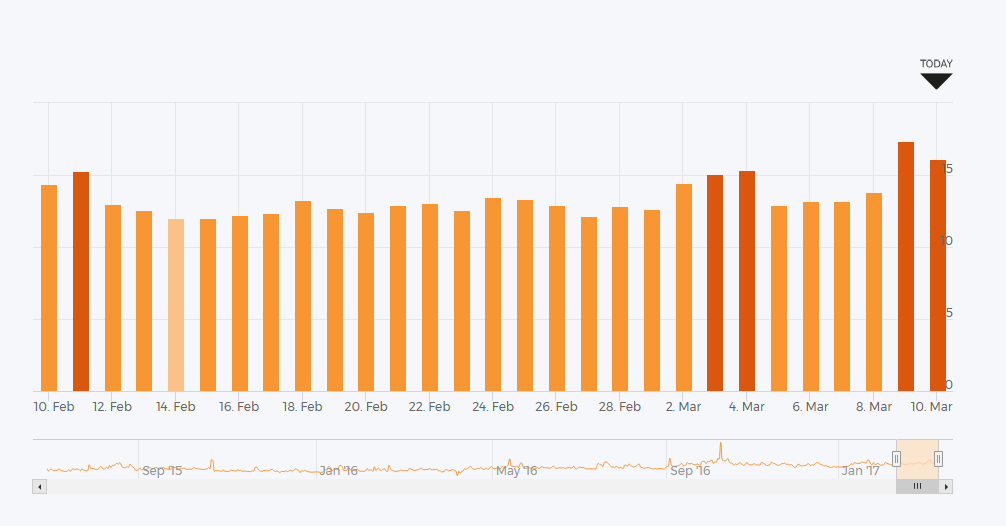
Screenshot taken from accuranker.com
Although none of the measurements are significant on their own, when taken together they make a worthwhile argument that a new Fred is on the loose.
WebmasterWorld and Black Hat World were among the ones who noticed some weird activity in the last week or so as well. And although Google is always dancing around, it seems that dramatic shifting has happened in the past couple of days. Or at least this is what people on SEO community from forums and on Twitter keep on debating.
Possible Google Fred Update “Victims”
It becomes easy to forget that looking up something on Google is not just a search, but a search performed on a particular type of search engine, according to particular algorithms and with particular implications in terms of customer experience and data privacy. And because Google as a search engine is ultimately a product which interacts with other products, other companies try to continuously adapt to Google’s way of working so that they profit from its popularity. In order for Google to retain that popularity, it must ensure that other companies don’t profit too much of its product, so that it remains trustworthy to its consumers (and a popular synonym for “search online” in the same time).
As hopefully, you have already noticed, we, at cognitiveSEO like to research a lot. And this is because at the end of the day research is creating new knowledge. Cutting-edge is our main core, and we want to stick to it. In the last hours, we’ve overworked our databases and the coffee machine in the quest of investigating the possible newest Google Fred Update.
As much as we’ve searched, we didn’t find a direct correlation between the dropped Google ranks and a possible algorithm change.
The SERP’s volatility is, as you know, as high as it gets and it would be tough and unrealistic to put our finger on a Google Update. We’ve found some examples of ranking drops which we are going to paste it below. Keep in mind that, for the moment, we cannot make a strong correlation between a possible Google Fred Algorithm and the current situation of the ranks.
As we take a look at the image above, it seems that a major drop in traffic has occurred on dankstop.com lately. The site is an online head shop based in the US that has a quite big number of links reported to the total of referring domain. Not to mention that most of their links are low or no authority.
They seem to have gathered a lot of new links in the period 26 February – 5th of March. You can check out its analysis here. Even taking all of these into consideration, we cannot yet correlate this drop with a possible Google algorithm update.
futuresofpalmbeach.com, is an addiction treatment center from Florida dropped in rankings as well lately. Except a bit of unusual Link Velocity, it seems that the site has nothing unusual in their link profile.
Is It Really a New Google Update?
When a product or a service becomes really popular, the company usually sets the sight for market leadership, a magical place of self-fulfilling (and self-replenishing) power. But there is an even more mythical place beyond that, where the product’s name becomes so ubiquitous and easily-identifiable with the product class itself, that a name for a product replaces the name for the product category. In many countries, for instance, the word “xerox” has become a verb which stands for the process of photocopying a document. In some countries “adidas” is the same as sport shoes, while in others “kleenex” is the same as tissue. But perhaps the most ubiquitous nowadays is the use of the word “google” as a verb, to mean “to use the Google search engine to obtain information about (as a person) on the World Wide Web.” That’s the Merriam-Webster definition, but in everyday use, there’s an even simpler definition: to google means, quite simply, to search online.
Therefore, with Google becoming more than a search engine, it’s almost natural that a lot of ranking updates to appear on a regulate basis. We are already familiar with Google Updates, call it the Panda, Penguin or Fred update, and we tend to associate these algorithm changes with link quality or content’s value.
For the moment we cannot be sure that Google Fred Algorithm Update even exists, let alone to correlate it to a link or quality content issue.
Ups and downs happen on a daily basis on Google’s SERP. Sometimes they are related to an algorithm change and sometimes they just happen as a part of Google’s volatility. As mentioned before, using our tracking tools we’ve made a serious, in-depth research in the past 24 hours, trying to find out any correlation between an alleged Google update and search rankings’drop. We found some irregularities, yet, nothing out of the ordinary or nothing that can be correlated directly to a new update or algorithm change.

 Site Explorer
Site Explorer Keyword tool
Keyword tool Google Algorithm Changes
Google Algorithm Changes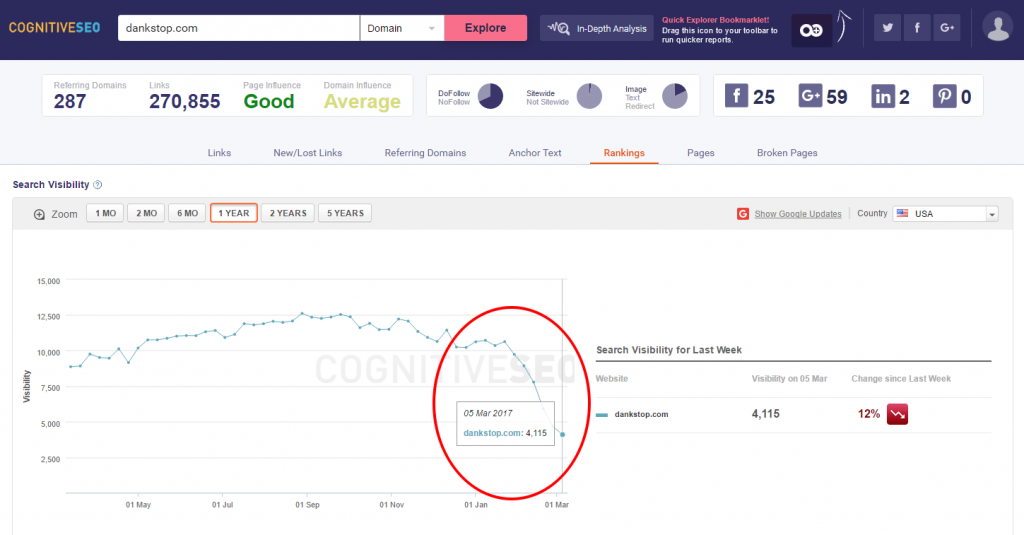
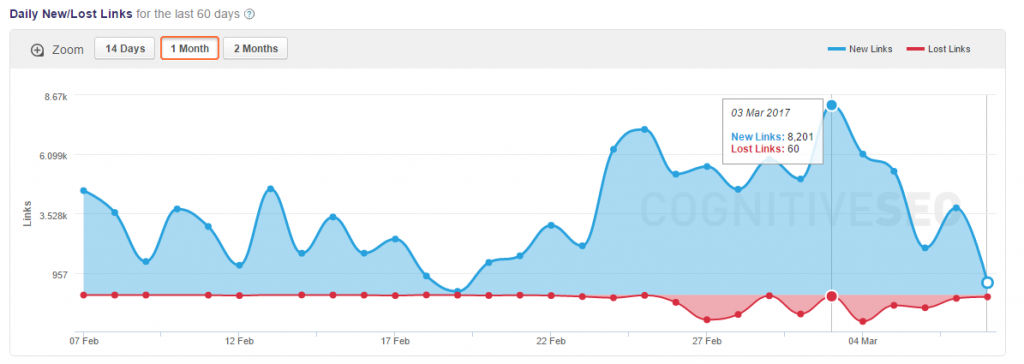
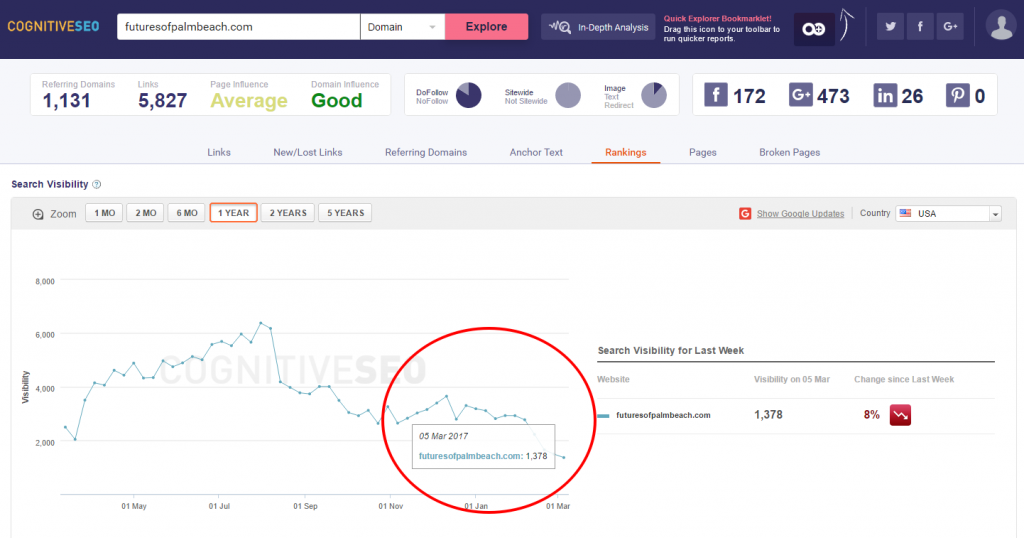


I think this update will effect website that use anchor text backlink more than 20% same
It might be the case; for the moment, we wait and see 😉
Not only you, many people think so. The FRED update, it’s all about the backlinks. However, Google did not confirm about this update.
It is really an important news for me as web design n SEO practicion .the update algorythm of google that called ” fred” make me more carefully to design a website that it will be on the page of google.thank all for this really important information.
I’m glad the info from the article was useful.
Come on, all the great minds could not find the simple reason that caused to the changes in the rankings?
It’s very simple: Google referred only to a certain percentage of incoming links to the site. The same percentage appears in search console. In February, was a refreshing to the profile that appears in search console and search algorithm refers to it. Who will make a deeper examination, will reveal to new links in search console that not appear earlier and some of them can be from years ago. That’s it.
Could be, Niv. We’ll wait and see. 😉
Seriously google? why are they making updates about link quality. This kind of update has a hole and very poor. Everyone can bomb any site with LQ links any day.
That’s true, Carlo! Yet, for the moment we have no clear info on what this is actually about. I think time will tell 😉
My traffic dropped by almost 50%. Hope it will be back again in SERP.
Hope you’ll be back on track, Chris!
Can you please give us more details on your drop? On which site occurred that? Thanks!
I lost my 50% traffic After updations of google algorithm fred.
Thanks for the input, Mohammed. On what site was the drop?
My site is fullformsof.com
Thanks for the info. We’ll be looking into this. You can take a look at your current status here: https://explorer.cognitiveseo.com/?u=fullformsof.com&m=*U*#section/0
I lost my 85% traffic After updations of google algorithm fred..Please helpme cornelia. my website droneers.com
You think you got everything right, all works fine till google decide to rollout update which is like flipping the coin:)
…and Google is permanently flipping the coin 😉
Well, if you look at dankstop . com, its very clear how poor their back-link profile is, whats their to guess?
Indeed, Mark. Yet, we cannot know for sure the exact reasons of a drop. There could be multiple causes and a Google update might be one of them.
It’s always interesting seeing the majority of seo’s freak out over any Google algorithm update. Nothing against the folks who’ve come here for help but really think about it…If you’re following proper guidelines to rank sites long term, NO update should affect you ever. I’ve been doing seo for 2.5 years and every time an update has been released my rankings always rise.
If we took this same pattern with sports, if a new type of turf was made you wouldn’t see soccer players flipping out saying they can’t play anymore. Those teams train and practice properly so it wouldn’t affect them.
Thanks for the input, Jon! I really liked the soccer metaphor; the team will need to play regardless of the land surface, yet, they will need to adapt their game. Tennis for instance is played on a variety of surfaces and each surface has its own characteristics which affect the playing style of the game. Yet, I get your point, a good tennis player should perform well on clay courts as well as on hard courts.
I think it has to do with links. One relation I can see for the sites (our own project sites) that dropped is that these sites had a higher link velocity in combination with age of domain. Some of these sites have dropped 80% in traffic. In one case the site recovered (today) but not on Google.nl (were it was killing the rankings) but on Google.be???
That’s a very interesting situation, Martin. tks for sharing. Can you tell us the site you had this issue on so I can take a look at it?
what do you think about tag link, it is one of the problem dropping mysite ?
Hi, there!
Not sure what you are referring to when you say tag link; can you please give me some more details or examples? Thanks!
This update actually improved our ranking so although it may hurt some, it equally benefits others.
This is how usually happens with G updates; some goes up, some goes down 😉
It is too soon to be 100% sure what it is yet.
Totally agree on this; time will probably tell, Danny.
Looks like the new update also hit the new websites. My website is new and Google does not index many pages.
Just make sure you don’t have any links from expired PBN domains. That gig is over and now auction PBN’s only is what works. Delete your links and watch the rankings creep back.
Hi, thanks for sharing. Is this update is confirmed or we need to wait for it?
I too saw a rise in most of the sites under my care right after ‘Fred’ but after July they are pretty much back at the same level again. Do any of you have any updates on yours? Maybe a couple of your sites that dropped are also now back on track?
Hi my keywords are in Top 5, Suddenly it drop 20. how I can fix, please help me out.
Sorry to hear that, Thomas!
You can check your SEO visibility to see if you have any sudden drop: https://explorer.cognitiveseo.com/?u=momentumoffice.com.au&m=*U*#section/4
Also, you should run an in-depth link audit and check your overall link profile, its naturalness, etc (https://cognitiveseo.com/googlepenguin/)